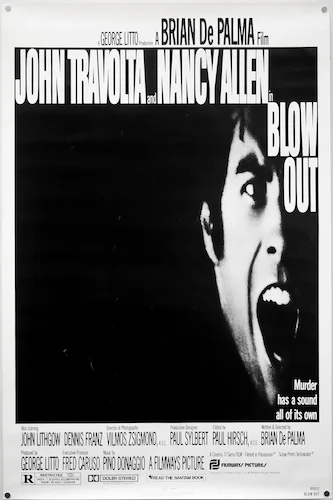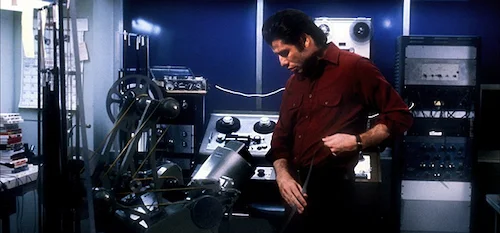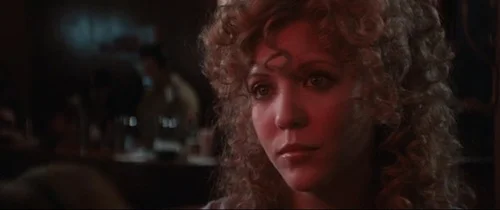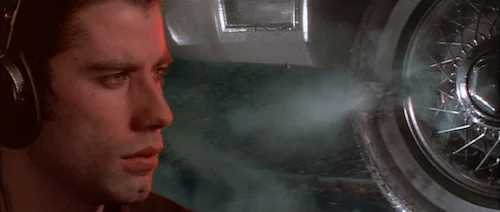Blow Out: On-This-Day Thursday
Every Thursday, an older film released on this opening weekend years ago will be reviewed. They can be classics, or simply popular films that happened to be released to the world on the same date.
For July 24th, we are going to have a look at Blow Out.
Brian De Palma has a reputation for being one of the most divisive filmmakers out there. The majority of his work can be challenged, either with praise in defence, or with hatred and confusion; how can this film be beloved? Case in point, I love Phantom of the Paradise, and borderline hate Scarface. De Palma specializes in pushing buttons, and every film is strictly a case-by-case analysis. Well, let's just say it: a good portion of his films are problematic as well. The way many female characters (and marginalized groups, especially in the LGBTQ community) are treated in his films are bound to cause a stir, especially in 2019. How well has Dressed to Kill aged aesthetically? How well has it aged culturally? Those may be two starkly different answers. What about Raising Cain? Sisters?
We arrive at Blow Out: what may unequivocally be the greatest film he ever made. I would argue it's still slowly making its rounds, and that it has not reached the full impact it was destined to make. This is one of the very few times De Palma toned things down a bit, and tried to give thanks to the filmmakers before him. This is a very loose remake of Michelangelo Antonioni's Blowup: a narrative free escape through the eyes of a photographer. There is a subplot where the lead character believes he has witnessed a murder while processing his negatives. De Palma fixated on this part of the film, much like the leads of both films, to the point of obsessive scrutiny. He then acknowledges Alfred Hitchcock with Blow Out: one of the greatest Hitchcockian works not made by the master of suspense himself.
Terry trying to use the equipment at his disposal to figure out a possible crime.
As a result, filmmakers now have expressed adoration for Blow Out. One example: Quentin Tarantini has crowned the film one of his all time favourites (or his absolute favourite, depending on when you ask him). You can imagine why the industry has a love for this film. You see, it's a noir murder mystery, but it's also a unique take on how a film can represent actual filmmaking. Jack Terry is a sound technician that works on B-movie slashers. In this film, a murder is discovered, but it isn't by photography. Terry witnesses a car accident while doing field recordings at a nearby pond. By associating the noises he recorded with what he saw, he concludes that the car's tire did not blow out, but it was rather purposefully shot out. This was no accident. This was planned.
Terry feverishly tries to piece together what he has discovered with the only tools he has: editing equipment. You see winding benches, editing tables (like an Intercine flatbed), animation booths, and so much more. This stands as one of the most creative ways a "detective" has solved a case I have ever seen in a film. It's also a spellbinding homage to how films are made in the first place as if Terry is constructing his own film that he is in. By the final shot (one I dare not spoil), you will truly know that Terry is a part of his own flick. It's a high you get from your a-ha revelation, which quickly turns into a lingering devastation immediately afterwards. Blow Out comes full circle in such a damning way, like realizing you're forever stuck at a dead end job, you will never see a loved one again, or life is a sick joke (perhaps all in one).
Sally: a symbol of innocence being thwarted by hidden agendas.
Looking past the gimmick of how the crime gets investigated, how is the actual crime? You're expecting typical De Palma '80s fare: slashing, slicing, bashing and dicing. All of this is interwoven into a tale of crooked politics during a presidential election, and the underworld of those hired for slander. As the murder is shoved way down underneath both narrative layers, for once it barely feels exploitational (compare this to the “shower” sequence in a film like Scarface, which is a riveting scene but indicative of this kind of film). Everything actually fits in this film, and they usually don't in a De Palma work (classic or not).
Blow Out is almost repulsively self aware. The film begins with a college slasher scene that is pornographic in tone. If you know nothing about Blow Out, you may flat out assume this film is the real deal and I wouldn't blame you (given the director). Terry reports to a jackass of a boss, who begs for a revolving door of scream queens to toss into his lazy, uninspired works. It truly is like De Palma was acknowledging his own patterns (or ones of other filmmakers in Hollywood); the apology would have been stronger had he changed his ways after this film (cue the narrator saying "he did not change his ways").
Pictured is one of the finest examples of De Palma’s signature use of two shots merged into one to create an aesthetic representation. In this case, it’s realization.
At the heart of the film is a toxic romance, but one glued together by the reliance both partners have on each other during this crisis. Terry is quick tempered, and truly hates being lied to. Sally is a bystander being told what to think or say by many different individuals. They quickly agree to a date, but for once a film acknowledges how insane this speed is. Sally narrowly escapes death. Terry just witnessed death. Why not get a couple of drinks? It's silly, and Blow Out completely admits it by making their connection incredibly irresponsible. The positive is that both people are in severe danger, so they do need each others support.
Red, white and blue: America’s colours, but also the merging of sirens, fireworks, and blood.
Blow Out is almost a satire on the film making industry, while being a genuine noir mystery. The result is a high stakes thriller, that transcends as a glorious statement on how films are made. The amount of nuance in this film is impossible to dig through, especially when spoilers are meant to be kept to a bare minimum. Does Blow Out think negatively or positively about filmmaking? About slasher flicks? About speedy romances? About the political climate in the '80s? Blow Out is a hazy middle ground where all worlds coexist at once, and none of it matters when innocence is being stripped away from us (either by misogynistic industries, political climates, or a literal serial killer going after strangers). It is a level of unadulterated meta commentary that De Palma never came close to again; not many other films of that decade did either, to be fair.
Andreas Babiolakis has a Masters degree in Film and Photography Preservation and Collections management from Ryerson University, as well as a Bachelors degree in Cinema Studies from York University. His favourite times of year are the Criterion Collection flash sales and the annual Toronto International Film Festival.









